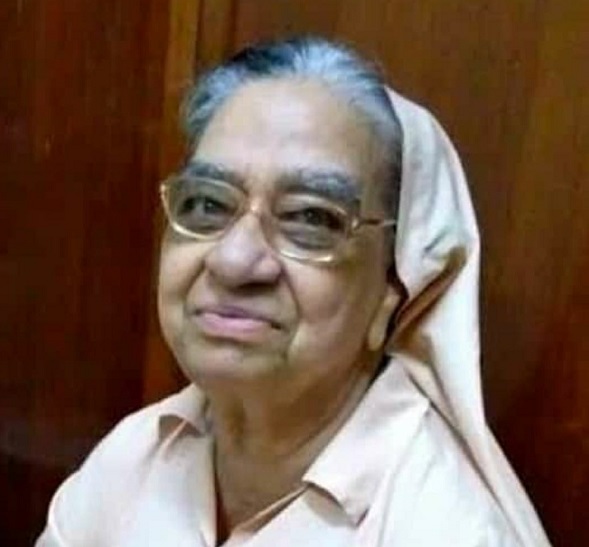Mumbai pays tribute to Sister Rosita, the angel of prisoners
The nun, who pioneered the prison ministry in the Indian Catholic Church, passed away at the age of 92. Speaking about prejudices against inmates, she said: “If Christ did not discriminate, why can't we, who claim to be his disciples, do the same?”
Mumbai (AsiaNews) – Mumbai’s Catholic community bid a final farewell yesterday to Sister Rosita Gomes, a member of the Franciscan Hospitaller Sisters of the Immaculate Conception and a pioneer in the pastoral ministry among inmates in the great Indian metropolis.
Sister Rosita passed away in the house of her institute in Bandra after more than 70 years of religious life. She would have turned 92 in November.
Known for her work among the poor and the marginalised, she was instrumental in getting homes built for lepers in 1967, during his stay in the convent of Agra. But she is remembered above all for the impetus she gave to the birth of pastoral ministry in prisons in India.
In the early 1980s, even before this ministry was established in the Catholic Bishops' Conference of India, she delivered letters to and from inmates and their families in Mumbai, going every week to the juvenile prison to pray and promote recreational activities.
It was God's Providence that showed her the way. She was asked to visit a man in prison who had accidentally killed his wife. After that she began to visit him periodically and bring his letters to his children to help them maintain good relations.
During those visits she met 21 other Catholic detainees, and came to realise the importance of having a contact person between them and their families.
Later, she began to devote herself to the rehabilitation of 42 Catholic boys in juvenile prison arrested for drug addiction, helping them reintegrate into society.
She loved to repeat the words of Jesus: "I was in prison and you visited me: now you enter the kingdom of heaven".
Starting in 1983 Sister Rosita organised Masses and cultural events in Bandra police jail and Umerkhadi juvenile home.
Despite her advanced age, she continued to visit these places until a few years ago, bringing food and other gifts, especially at Christmas and Easter and on 14 August, the feast day of Saint Maximilian Kolbe.
Sister Rosita also invited many lay people to help her in her prison ministry, getting them the necessary permits.
“The Church, in particular, has a special task towards the marginalised and those who languish in remand homes and prisons. Many, through no fault of their own, are victims of unjust and oppressive structures,” she said.
“If Christ did not discriminate, why can't we, who claim to be his disciples, do the same? Why not let our Christianity come to life, bringing God's message of justice, peace and love to those who are locked up in prison?"
Sister Rosita was also known for her devotion to the Way of the Cross. For more than 20 years, she revived the devotion of the Via Crucis every Friday during Lent in the six inner streets in suburban Bandra.
She was a tireless missionary, who responded to the needs of the time. Another mission in which she was actively involved was helping orphans and destitute children, welcoming them to the boarding school and taking care of them until they completed their studies.
"Sister Rosita was a person of great faith, faithful to God, to the Church and to her congregation,” said Fr Vernon Aguiar, rector of the Basilica of Our Lady of the Mount (Mount Mary) who accompanied her to prisons to celebrate Mass.
She “was constantly nourished by the reception of the sacraments in a deep relationship with Jesus with the good work she did. Now her memory will remain alive through the love she brought into the lives of so many.”
05/11/2019 15:17
11/04/2014
30/05/2016 12:50







.png)










